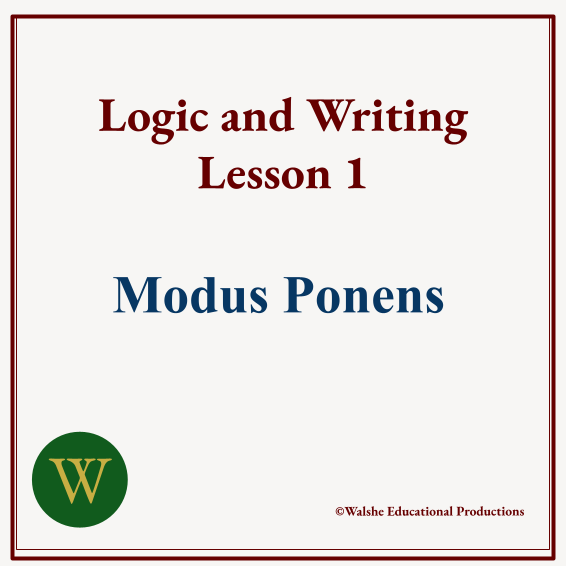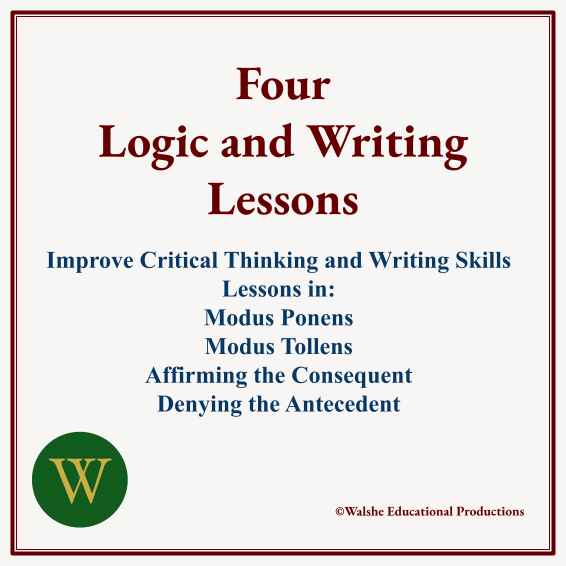logic

What does logic have to do with Writing?
In order to be understood, writing must be reasonably logical. Going beyond just being understood, we can achieve persuasiveness. Logical arguments are easier to follow than less coherent claims and are therefore more likely to be accepted. Essays and other forms of persuasive writing depend on accurate and effective use of valid logical arguments to achieve credibility and prove their points.
Studying logic produces more than an ability to create skillful, persuasive arguments. Knowledge of what constitutes a valid argument promotes the ability to detect and then reject false arguments. In an environment where content from countless sources is available to people everywhere, the ability to recognize fallacies and other forms of invalid reasoning has an urgent importance.
A familiarity with the logic of deductive arguments can improve the ability to write clear arguments and to detect false, misleading statements. Simple writing exercises using a logical process like modus ponens can improve anyone’s writing skills while focusing on basic logic. Deliberate practice writing according to a logical form encourages logical thinking and writing that could find its way into all kind of prose and poetry.
Modus ponens is Latin for “method of placing”. In the example below a premise is a statement or proposition used in an argument. P and Q represent the ideas expressed in a premise.
STRUCTURE OF MODUS PONENS:
1st Premise: If P, then Q (conditional, if…then statement, P is called the antecedent, Q is called the consequent.)
2nd Premise: P
Conclusion: P. Therefore, Q
So, if P exists and leads to Q then the conclusion is that Q exists.
See the following four examples:
| Ist Premise: If P, then Q | If it’s raining, I will wear a raincoat. |
| 2nd Premise: P | It’s raining. |
| Conclusion: therefore Q | Therefore I will wear a raincoat. |
| Ist Premise: If P, then Q | If there are no clouds, I will see Mars tonight. |
| 2nd Premise: P | There are no clouds. |
| Conclusion: therefore Q | Therefore, I will see Mars tonight. |
| Ist Premise: If P, then Q | If Giacomo da Lentini wrote the first sonnet, then the form was invented by a Sicilian. |
| 2nd Premise: P | Giacomo da Lentini wrote the first sonnet. |
| Conclusion: therefore Q | Therefore, the form was invented by a Sicilian. |
| Ist Premise: If P, then Q | If interest rates will fall, more people will buy houses. |
| 2nd Premise: P | Interest rates will fall. |
| Conclusion: therefore Q | Therefore, more people will buy houses. |
To use this as a writing exercise or use it to teach logic to students at any level, simply use the definition and examples above and a table similar to this one.
| Ist Premise: If P, then Q | |
| 2nd Premise: P | |
| Conclusion: therefore Q |
To buy an easy to use lesson in Modus ponens, including a full explanation, examples and space for practice, click on the button below:

Modus Ponens mirrors basic human logic, by following the if … then, cause and effect style process. Another form that produces a valid argument, Modus Tollens, works by saying that if the cause is not present there will be no effect:
1st Premise: If P then Q
2nd Premise: Not P
Conclusion: Therefore Not Q
Two variations of this line of reasoning that produce false arguments, affirming the consequent and denying the antecedent, are incorrect versions of the basic modus ponens form.
To buy a set of lessons in Modus Ponens, Modus Tollens, Affirming the Consequent and Denying the Antecedent, click on the button below. These lessons include full explanations, easily followed examples and space for practice.

The Logic of Poetry
The use of logic in writing poetry with a persuasive intent does not currently get the attention it deserves. Logic is explicitly employed in many poetic forms. This can be seen in many sonnets which introduce and support ideas. The ninth line of a sonnet, the volta, also called the turn, often forms part of a logical argument by presenting a view contrary to that outlined in the first eight lines. Consider Shakespeare’s Sonnet 18:
Shall I compare thee to a summer’s day?
Thou art more lovely and more temperate:
Rough winds do shake the darling buds of May,
And summer’s lease hath all too short a date:
Sometime too hot the eye of heaven shines,
And often is his gold complexion dimmed,
And every fair from fair sometime declines,
By chance, or nature’s changing course untrimmed:
But thy eternal summer shall not fade,
Nor lose possession of that fair thou ow’st,
Nor shall death brag thou wander’st in his shade,
When in eternal lines to time thou grow’st,
So long as men can breathe, or eyes can see,
So long lives this, and this gives life to thee.
The poem begins its argument with a list of hazards faced by youth and the vulnerability of young people to death. The darling buds of May, young people, are at the mercy of “rough winds” and “chance, or nature’s changing course untrimmed” while “summer’s lease hath all too short a date”.
After establishing ideas and creating images of the sad fragility of life, the ninth line volta, “But thy eternal summer shall not fade” makes an abrupt change. It abandons the resigned, pessimistic tone of the previous lines by introducing an argument for immortality, concluding with:
” When in eternal lines to Time thou grow’st.
So long as men can breathe, or eyes can see,
So long lives this, and this gives life to thee.”
The sonnet uses deductive logic to support the assertion made in the volta. It presents reasons to dismiss the fearful melancholy of the first eight lines. Shakespeare argues for the existence of immortality with reasons rooted in a firm belief in his power as a writer. He insists the sonnet’s subject gains eternal life by being included in the lines of his poem.
To practice identifying voltas, and how they operate within the logic of the sonnet, try this exercise where students identify the volta and the difference in the message of the poem before and after the volta. Students complete tables like the one in the example below. Shakespeare’s sonnets 5, 7, 23, 60 and 78 are good examples of sonnets with easily followed arguments.
| Poem | Sonnet 18 |
| Message before the volta | Young people may die |
| Volta | But thy eternal summer shall not fade |
| Message after the volta | Immortality is possible |
For more lessons in logic and lessons in fiction writing, poetry, grammar, rhetoric and vocabulary, click on the link below to reach my Teachers Pay Teachers store.